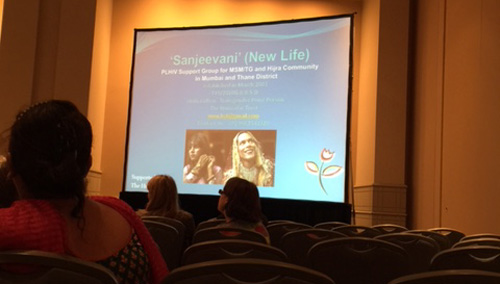Posted by Lucile Scott, September 21, 2015
 Thissadee Sawangying (left) poses with an American transgender advocate during the conference in Philadelphia. In June, the GMT Initiative (with support from the Arcus Foundation) sponsored two advocates from Thailand in attending the 14th annual Philadelphia Trans Health Conference, a three-day event focused on the health and well-being of transgender people and communities that draws nearly 4,000 advocates from around the globe. This marks the first year that the GMT Initiative has sent grantee partners to the conference, and the hope was that they would not only learn new and effective strategies that could aid them in their work in Thailand, but also tap into the growing and increasingly visible international transgender rights movement.
Thissadee Sawangying (left) poses with an American transgender advocate during the conference in Philadelphia. In June, the GMT Initiative (with support from the Arcus Foundation) sponsored two advocates from Thailand in attending the 14th annual Philadelphia Trans Health Conference, a three-day event focused on the health and well-being of transgender people and communities that draws nearly 4,000 advocates from around the globe. This marks the first year that the GMT Initiative has sent grantee partners to the conference, and the hope was that they would not only learn new and effective strategies that could aid them in their work in Thailand, but also tap into the growing and increasingly visible international transgender rights movement.
“2015 has seen a groundswell of attention paid to transgender health issues,” says Kent Klindera, director of the GMT Initiative. “The data shows rates of HIV and gender-based violence among transgender populations that are staggeringly high, and throughout the world, trans activists are claiming a space at the table to fight for their rights.”
Thissadee Sawangying, project manager at Health & Opportunity Network (HON), a GMT Initiative grantee partner organization focusing on the health needs of transgender sex workers in Pattaya, Thailand, was one of the GMT Initiative-sponsored attendees. “I learned many exciting things, and hope to carry the knowledge and experience into our network to outline a new strategy for improving trans health and rights in Pattaya,” she says. “Because while we have come a long way in certain areas in Thailand, like with the availability of gender reassignment surgery, there is still a lot of violence and discrimination, and we have a lot to do.”

Conference participants watch a film.
Despite the high rates of HIV among them, transgender women have been largely overlooked in national and international HIV responses. And in Thailand, as in most countries, they are often grouped with men who have sex with men (MSM), instead of being defined as a distinct key population with their own HIV prevention, treatment, and outreach needs. But now, thanks to the increasingly vocal transgender advocacy movement, this is slowing starting to change in Thailand and around the world.
In July, the World Health Organization (WHO) released Transgender People and HIV, its first policy brief focusing specifically on transgender individuals. It also co-hosted a consultation in Bangkok—along with USAID, the United Nations Population Fund (UNFPA), the United Nations Development Program (UNDP), and the International Reference Group on Trans* and Gender Variant and HIV/AIDS Issues (IRGT)—for transgender community members and global experts to discuss another document currently under development, the Trans Implementation Tool (TRANSIT). Another new document,the Asia-Pacific Trans Health Blueprint (AP Blueprint)—being developed through a collaboration between the Asia Pacific Transgender Network, UNDP, and USAID—will profile areas in the Asia-Pacific where transgender health services are most needed.
“I think it is very important for local governments in Thailand to learn about how they can work to support trans health needs,” says Sawangying. “And once we have these documents and guidelines, we can send them to local non-governmental organizations, so they can have action plans to advocate the local officials.”
Officials in Thailand have started to take action. The Thai Health Ministry has recently started sponsoring HIV implementations designed specifically to meet the needs of transgender women, and a national advocacy movement to gain legal gender recognition for transgender individuals is building momentum. “This year feels like a turning point for trans health and legal rights,” says Sawangying. “And I think in five more years we will have seen a lot of change.”